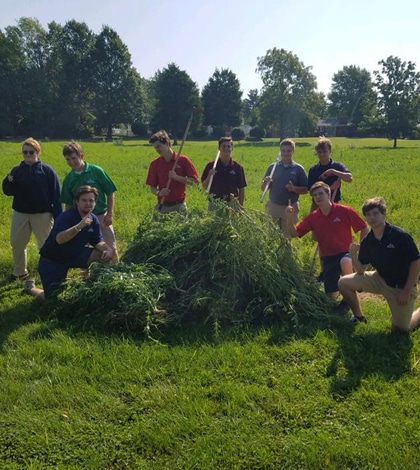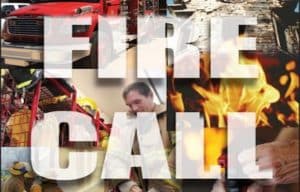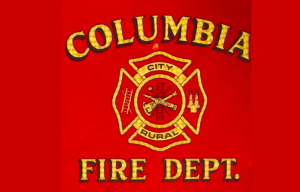Gibault alfalfa field yields first crop

Gibault High School students removed two types of ragweed from their alfalfa field last week prior to harvesting its first crop. Pictured, front row, from left, are Ian Metcalf, Mark Branz and Seth Berenz; back row: Lace Brandenburg, Lucas Herrmann, Will Janson, Ryan Swindle, Ryan Kruse and Liam Brauer. (submitted photo)
After months of hard work and waiting that included a failed crop, Gibault Catholic High School had its first cutting from its alfalfa field last week.
The first harvest yielded 3.5 bushels of alfalfa hay.
Two farmers near Hecker cut, raked and baled the alfalfa.
Plans to plant the plot with alfalfa came together last August. Steve Wilke approached the school with the idea after he planted grass on land next to his business.
The appropriate stakeholders at Gibault agreed a crop would be better than the dozen cedar trees that were in the field.
“We figured it would help free up staff and personnel here to do other things,” Gibault science and agriculture instructor Greg Wiegand said. “We also hope it’s going to generate a fairly decent revenue over the next few years and help the school out with other activities and such.”
Employees of Wm. Nobbe & Co. then came and prepared the ground for the seeds. Over Labor Day weekend in 2017, members of the Gibault Men’s Club, including Wilke, then sowed the field. Lastly, a Gibault alumni who is a farmer and has a son at the school came and ensured better soil to seed contact.
Despite all that effort, the first crop did not bear fruit.
“Due to the drought conditions, the first crop really didn’t take,” said Wiegand, who is also Gibault’s FFA adviser. “That’s why it took until this past week to finally get our first cutting. So the first crop really wasn’t that successful.”
After that first crop failed, Gibault debated whether to wait until this fall to plant again. They decided to replant the field in April, however, so Wm. Nobbe & Co. and the same farmer came out to once again prepare the ground for the seed.
This time it worked.
The alfalfa Gibault grows is Roundup Ready Alfalfa, a high-quality variety that requires low maintenance.
The school went with that kind after consulting with local farmers and Gateway FS, which also sprayed the field with Roundup solution in June to kill weeds.
“You should, in effect, just have a clean alfalfa crop,” Wiegand said of the plant. “That way if you wanted to feed it to horses or show animals it would be a better quality hay. And having a better quality hay, we should be able to charge a little bit higher premium and make a little bit more money than if we just had a regular alfalfa or clover hay in there.”
In addition to the money made off the crop, which will also go toward senior scholarships, it affords another benefit by providing Gibault students with learning opportunities.
So far, Wiegand said students have had the opportunity to crop scout and identify weeds. But as the project becomes more established, students will get more power like being able to identify if there is an insect or weed problem.
“We’re trying to turn it over to the kids, more or less, and it’s going to be their responsibility to manage this and try to make it as efficient as possible,” Wiegand said. “They’re going to do all the marketing and some of the hands-on.”
“The main thing is the kids get involved and take ownership,” he added. “They’re showing us what they can do with a small-scale farm business.”
They will not have many opportunities to do that this year, as Wiegand said they plan to overseed in the fall and have more cuttings next season, which will benefit students.
“Realistically, if this is established and goes well, instead of one cutting this year we might get four cuttings this year or if we have an ideal year maybe five,” Wiegand said. “And each cutting will get better. It will be leafier, a better quality and more desirable for the animals.”
Next year should also require even less maintenance, with spraying for weeds taking place once or twice.
The alfalfa will be used primarily to feed show animals like horses, though the first cutting would also be suitable for feeder cattle.
Gibault currently has no buyers for its crop, though a portion of it will probably go to the farmers who helped harvest it. If interested in purchasing some alfalfa, call the school at 939-3883.






